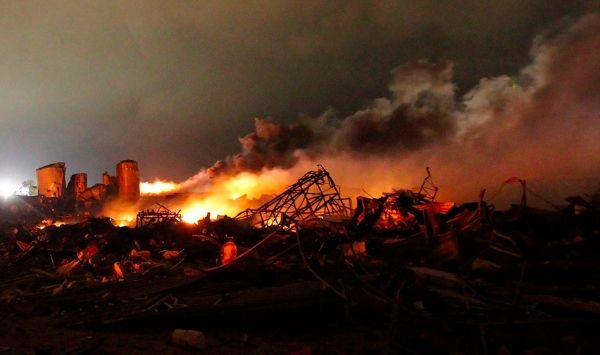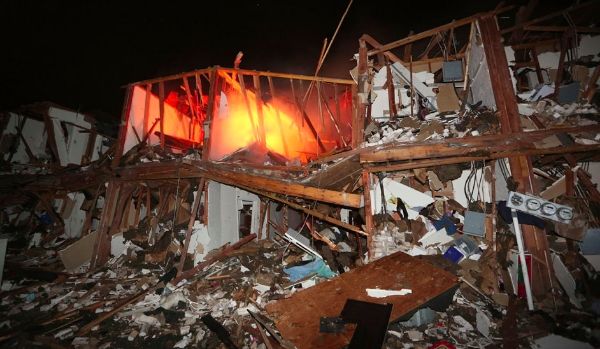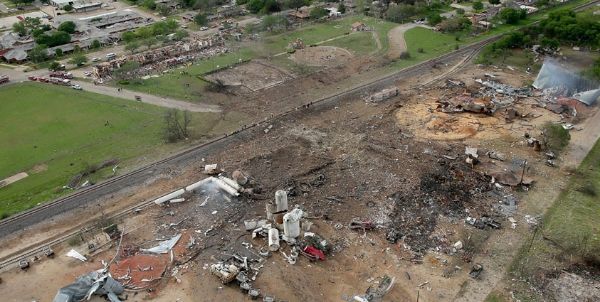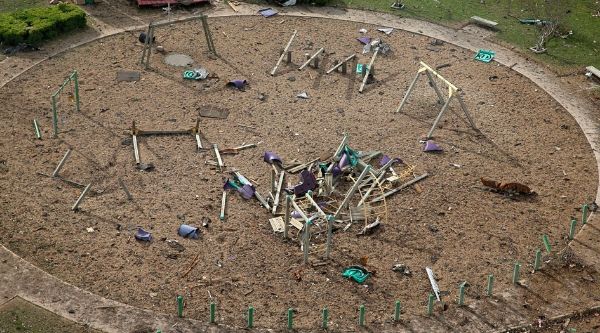[Content Note: Explosion; images of destruction; injury; death; racism; disablism; regionalism.]
On Wednesday of last week, between the Boston Marathon bombing on Monday afternoon and the violent police chase for the Tsarnaev brothers through Watertown, Massachusetts on Thursday evening, a fertilizer plant explosion happened in the central Texas town of West.
Background from a piece I wrote at Austinist (updated with correct numbers of the dead):
Just before 8:00pm last Wednesday evening, a fertilizer plant in the small central Texas community of West exploded. It had been burning for at least 20 minutes and volunteer firefighters from the town were on site trying to put out the blaze. Suddenly hundreds of tons of ammonium nitrate combusted, creating such a massive explosion that people heard the blast 50 miles away. The explosion left a 22-foot-deep crater at the site. It tore through neighboring buildings, demolishing an apartment complex and a nursing home, and destroying 150 homes in only a few seconds of time. In a town of 2800, roughly 8% of the entire population was either injured or killed with 15 people dying (12 of them first responders) and nearly 200 injured.

There has been very little coverage of the explosion, especially in comparison to the non-stop, wall-to-wall coverage of the Boston bombings. This despite the fact that West killed 5 times as many people, and many of those first responders, and injured roughly the same number of people injured in Boston. National media has been relatively silent. And I mean relatively: Mike Elk has done good coverage, All In With Chris has covered it, CNN has a small part of their homepage dedicated to West.
But it has mainly been local reporting in Waco, Dallas, Austin, and Houston that has shed light on what happened last Wednesday evening, who was harmed, and why things weren't handled earlier. Kudos to local news.
Theories about why this is the case (culled from many conversations with many smart people on Twitter):
1) West is about the greed of capitalism and we just don't have a good narrative in this country to talk about that. If we want to seriously talk about what happened in West, we have to talk about a lot of things people just don't want to discuss: de-regulation of industry, failure of oversight, workplace safety (again, Mike Elk is amazing on this particular issue). All of these topics are part of our country's current and on-going obsession with "free market labor practices" that leave much of regulation, oversight, and workplace safety to the owners of these plants, the very people who make more money when they walk the dangerous line between profit and explosion. For example, we'd have to admit openly that 13 people die on the job every day in the US and that most of those deaths go unnoticed and, in fact, are seen as collateral of an otherwise successful industrial, political, and economic systemic.
Terrorism, on the other hand, especially any that we can tie to Islam, has a built-in narrative of "The Other" onto which we can all immediately latch. This was most obvious when the identities of the two bombers were released on Friday and the mainstream media took to calling them "ethnic Chechens," focusing mainly on their ties to that particularly restless part of Russia and very little on the 10 years they spent living in the US in the post-9/11 era. Are Chechens Really White? became a valid question, one that pushed on the easy narrative of "Muslim bombers = not American, not us" but one that has not made many inroads in the national media.
Mike Elk at the Washington Post:
Aaron Albright, who worked on failed mine safety legislation in the wake of the Upper Big Branch mine as an aide to Rep. George Miller (D-Calif.), joked on Twitter that the media opted to focus almost exclusively on the Boston bombings because the two stories were like "CSI/Mission Impossible vs. [a] PBS documentary." The story of alleged terrorists with Chechen links seems far more exotic and threatening than does the story of a workplace disaster that would have been preventable if the company followed the rules.This is related to telling the stories of Others. When the story is about capitalism and greed, it's harder to pinpoint a single person and if we do, then we may not like what we learn.
Yet, death in the workplace is a much more real possibility for almost all Americans than is death at the hands of a terrorist. In 2011, 4,609 Americans were killed in workplace accidents while only 17 Americans died at the hands of terrorists — about the same number as were crushed to death by their televisions or furniture. One could argue that terrorists get more attention because they intentionally aim to kill people, but disasters like at Upper Big Branch are also the result of companies violating workplace safety laws.
Aleksander Chan points out how little we have talked about the owner of the Fertilizer plant, Donald Adair:
Out of focus for much of the proceedings so far has been the plant's parent company, Adair Grain. That stands to change and very quickly as lawsuits will likely aim to name the company and its owner, Donald Adair, as defendants in lawsuits. News reports have depicted an unexpected swell of support for Grain, with Reuters penning this story about how the town isn't holding a grudge against him.We know almost every detail about the Tsarnaev brothers' lives and next to nothing about the man who heads a company that just destroyed a huge part of a town, killed first responders and residents, and has left many in the community with injuries that they will deal with for the rest of their lives. I could, if pushed to, probably even pick the mother of the Tsarnaev brothers out of a lineup because her face has been all over the internet and TV.
What does Donald Adair look like? I could not begin to say. I cannot find an image of him anywhere online.

A fire burns in a destroyed apartment complex, near a fertilizer plant that exploded in West, Texas, on April 18, 2013. (AP Photo/LM Otero)Adair did release a statement 6 days ago (his heart is broken, by the way).
We've since found out that OSHA last visited the plant in 1985, that in 2006 it was cited and fined by government agencies for multiple issues, and as the Huffington Post reports, "in June 2011 — less than two years before the explosion — the private company that owns the plant, the West Fertilizer Co., filed an emergency response plan with the Environmental Protection Agency stating that there was 'no' risk of fire or explosion at the facility." Bryce Covert writes that "West Fertilizer Co. failed to report to the Department of Homeland Security how much ammonium nitrate it had on hand, despite the fact that it had far more than is required to report." (Covert's rundown of all the arms of oversight and when they last inspected, cited, or fined the West Fertilizer Co is spectacular.)
Donald Adair and his life will not fit a narrative that lets us wall him off from "us". Most people in this country buy so hard into the "free market/whatever it takes" view of capitalism and Donald Adair will probably just look like a guy who was doing what the system allowed and plenty will ask themselves, "would I really have done anything differently?"
And so, we should be talking about this as a nation and as a society.
Why do we find creating pressure-cooker bombs in our house and planting them in a crowd unimaginable but stockpiling the very chemical that blew up the Murrah Building in Oklahoma City and not answering for that even when federal agencies said you needed to shrug-worthy?
How did we get these priorities?
WHY ARE WE FOCUSING ON THE CASE THAT PROBABLY ISN'T NEARLY AS PREVENTABLE? I want to yell that loudly through a megaphone on air at MSNBC all day tomorrow.
It is a reminder (not that we need one, really) of how powerful the ability to place someone in a category of "other" is in shaping how we deal with tragedy and our willingness to really talk about the causes of those tragedies (that's why anytime someone uses a legal semi-automatic weapon to shoot up a public place we have to immediately qualify them as "crazy," so we can distance their reality from our own and see them as something that is not part of "us," the rational and compassionate ones).
There are two other reasons I believe that West hasn't received much coverage and they have to do with two other specific "othering"s that happen within the media and our national narratives.
2) West happened in Texas, the marathon bombings in a northeastern state.
And as I have often remarked on, when things happen in Texas (especially things that people can relate directly to Texas politicians), people in other parts of the country just don't care. There are two reasons for this.
First, most of our major media in this country is created in New York and DC, then over on the west coast in the Bay area and Los Angeles. When things happen in those places they are, for much of the media, "close to home." Texas is not.

Aerial view of the damage left behind by a massive explosion at the West Fertilizer Company, on April 18, 2013. (Chip Somodevilla/Getty Images)Second, it's a, "well, the people in the state voted for those people so what did you expect" kind of response. And I mean this literally: people (liberals, in fact) have been coming into my mentions on Twitter over the last week to tell me this almost verbatim whenever I wonder why no one cares about what happened in West.
Of course, no one ever really wants to talk about the way that the DNCC dispenses money, leaving those of us in red states that are considered "not winnable" to fend for ourselves when it comes to financing campaigns. Or the way in which redistricting laws (which, thankfully, have been deemed unconstitutional here) seriously damage the ability of anyone other than the GOP to win here. Or that the line of "your vote doesn't really matter because of where you live" creates voter apathy. Or that liberals only really ever talk about us down here when it is to disparage us, tapping into long-used stereotypes about "The South."
As soon as a preventable fatal disaster happens here in Texas, there is a nod to the casualties and then a shrug, writing us off as deserving fools who asked for this when we went (or did not go) to the ballot box. That becomes the SINGLE cause of this disaster, one that could have been prevented if us in Texas didn't live up to the low expectations of liberals in the rest of the country.
Boston, on the other hand, is a tragedy without cause. We need it to be that Islam is radical and foreign. Or that these men were angry because they were raised to be. Or, as Putin will tell us, Chechnya just produces violent people. Or that the brothers were sociopaths. Because what else could it be?
On the day of the West, Texas Memorial Service to honor those who died last week, people went to the opening of George W. Bush's Presidential Library and with an astonishing collective amnesia, discussed his presidency as if the policies he helped to enact as President, the wars he started, and the mindset he encouraged did not lead — at least in part — to last Monday's bombings. As if his own radical religion played no role in his Presidency, politics, and decisions to blow up a lot of people in another part of the world.
Nope.
The narrative becomes: Texas politicians (one of those being former Governor George W. Bush) are the issue for and the cause of West's explosion but the bombings in Boston are solely about sociopathic individuals involved in a radical religion. We are easy to understand in Texas: We make poor political choices. The Boston bombers are complete mysteries and their motives shrouded. As if this country didn't re-elect George W. Bush and us all play some collective role in fostering anti-US sentiment.
In the end, it also comes down to something Melissa McEwan wrote here at Shakesville:
Of course is to say nothing of the zoning laws that allowed a fertilizer plant to exist in such close proximity to residences and schools. Many residents say they saw it coming, and, naturally, because we live in a garbage culture full of victim-blaming and tasking individuals with solutions for systemic problems, there is already a lot of "why didn't they move?" where "this plant was irresponsible and deregulation is a fucking nightmare" should be.Anyone who lives in a space where they are the political minority and they talk to someone who agrees with their politics but lives in a place where those politics are in the majority have heard the "why don't you just move?" as if that is a viable or useful response. It is an excuse that refuses to take into account at all people's lived experiences, their desires to be near family or friends, the pressing issue of finding a new job in a new place, or people's complete inability economically to just pick up and move (to be able to do that is a privilege). It is a conversation killer and, as McEwan wrote, victim-blaming.
3) West happened in a rural space while Boston has been an urban center in this country since the earliest days of European settlement.
In one sense, it is simply easier to report on Boston. There are already built-in resources for reporting — news stations, equipment, reporters — in Boston that do not exist in West.

The explosion destroyed this playground across the street, shown from the air on April 18, 2013 in West, Texas. (Chip Somodevilla/Getty Images)We also have lots of ideas about people who live in rural places. They are dumber (which is the reason why news of Honey Boo-Boo's mom investing money in her children's future was met with complete disbelief and some chuckling) and they are old-fashioned and conservative (i.e. not progressive, not modern). Or as Obama once famously said while trying to explain why we should care more about small town people in the US and do better to understand their way of life, "it's not surprising then that they get bitter, and they cling to guns or religion, or antipathy toward people who aren't like them, or anti-immigrant sentiment, or, you know, anti-trade sentiment [as] a way to explain their frustrations." Unlike Obama, though, much of the mainstream media doesn't want to take the time to understand these people. It is easier to laugh at them, see them as "strange," paint them with broad strokes, and, if necessary, simply ignore them all together.
In conclusion, the reasons that there isn't more media coverage of the explosion that happened in West are because it happened at a bad time (competing with the easy-to-latch-onto narrative of "Muslim terrorists"), in a bad place (rural Texas), and its causes too much a part of the fabric of the myths we tell ourselves about the greatness of our country and the the greatness of our economic system.




Shakesville is run as a safe space. First-time commenters: Please read Shakesville's Commenting Policy and Feminism 101 Section before commenting. We also do lots of in-thread moderation, so we ask that everyone read the entirety of any thread before commenting, to ensure compliance with any in-thread moderation. Thank you.
blog comments powered by Disqus